

MARITIME LAW IN 2023: A REVIEW OF DEVELOPMENTS IN CASE LAW
Your guide to the key legal developments in maritime law in 2023, including the law of shipping contracts, general average, and admiralty issues.
Already an i-law subscriber?
Our much-anticipated annual case round up is here! Essential reading for anyone working in maritime law, insurance, and shipping this comprehensive guide summarises the key litigation trends and flagship cases that took place in 2023.
The review covers:
- Cases from the widest set of jurisdictions to date, including courts in the Eastern Caribbean, India and Malaysia.
- NEW for 2023: a “Sanctions” header, considering judicial review of sanctions decisions involving vessels.
- Coverage of two judgments arising from Australian cruise ship litigation following Covid-19 outbreaks on board Ruby Princess - demonstrating the force and impact of Australian consumer law.
- Consideration for wreck removal standard terms and the definition of ships, courtesy of a very recent Singapore case Bumi Jaya Salvage & Engineering Sdn Bhd v Brave Worth Shipping Co Ltd (The Kmax Pro)
- Insight into a number of bill of key bill of lading cases and admiralty decisions, including a decision arising from the Ever Given grounding in 2021.
- The decisions in Unicredit Bank AG v Euronav NV, Quadra Commodities SA v XL Insurance Co SE, The MSC Flaminia and Kuvera Resources Pte Ltd v JPMorgan Chase Bank NA, amongst many others.
The scope of this analysis encompasses the common law jurisdictions of England and Wales as well as Singapore, Australia, India and Hong Kong SAR. A summary of appeals currently in progress is included.

Dr Johanna Hjalmarsson LLM
Lloyd’s List Intelligence Associate Professor in Maritime and Commercial Law, Institute of Maritime Law, Southampton Law School, University of Southampton

Dr Meixian Song
Senior Research Fellow at Southampton Law School, University of Southampton
View Contents List
- Bills of lading
- Charterparties
- Voyage charterparties
- Time charterparties
- General average
- Carriage of passengers
- Ship building and ship sale
- Sale of goods
- Wreck removal
What we offer
- A complete picture of the vessel/fleet, ownership, and movements data
- Easily identify risk across all the data
- Document and communicate any risks found
- Admiralty liabilities
- Admiralty procedure
- Limitation of liability
- Judicial sale

Maritime & Commercial on i-law

Legal professionals

Request your copy
Panel speakers.

Austin John (Moderator)

Leigh Hansson

Masooma Kazmi
No speaker yet, sponsored by:.


Library electronic resources outage May 29th and 30th
Between 9:00 PM EST on Saturday, May 29th and 9:00 PM EST on Sunday, May 30th users will not be able to access resources through the Law Library’s Catalog, the Law Library’s Database List, the Law Library’s Frequently Used Databases List, or the Law Library’s Research Guides. Users can still access databases that require an individual user account (ex. Westlaw, LexisNexis, and Bloomberg Law), or databases listed on the Main Library’s A-Z Database List.
- Georgetown Law Library
- Treatise Finders
Maritime and Admiralty Law Treatises
- Introduction
Introductory Resources
In-Depth Resources
- Admiralty and Maritime Law by Thomas Schoenbaum Comprehensive guide on the special procedures, rules, jurisdictional questions and remedies for American and international admiralty and maritime law.
- The Law of Admiralty by Grant Gilmore & Charles Black Call Number: KF1104 .G47 1975 Although Gilmore and Black has not been updated since 1975, it is still one of the leading treatises on the subject of maritime law.
- The Law of Seamen by Robert Force & Martin J. Norris This online treatise provides coverage of maritime law governing rights and obligations of merchant seamen. It includes statutes, rules, and case law and covers topics such as jurisdiction, definitions, duties of American consults, relation of foreign counsels to seamen, maritime administrative law, shipping articles, log books, desertion, crew salvage and more.
- Last Updated: Aug 9, 2023 4:46 PM
- URL: https://guides.ll.georgetown.edu/treatise-finders/maritime

Maritime Law in Motion
- © 2020
- Proshanto K. Mukherjee 0 ,
- Maximo Q. Mejia 1 ,
- Jingjing Xu 2
Faculty of Law, Dalian Maritime University, Dalian, China
You can also search for this editor in PubMed Google Scholar
Maritime Law and Policy, World Maritime University, Malmö, Sweden
Plymouth business school, university of plymouth, plymouth, uk.
- Highlights pioneering topics, such as the regulation of autonomous ships and block chain applications to commercial maritime law
- Includes Chinese legal perspectives on various aspects of international maritime law
- Explores the impacts of climate change on maritime law issues
Part of the book series: WMU Studies in Maritime Affairs (WMUSTUD, volume 8)
65k Accesses
19 Citations
11 Altmetric
This is a preview of subscription content, log in via an institution to check access.
Access this book
- Available as EPUB and PDF
- Read on any device
- Instant download
- Own it forever
- Compact, lightweight edition
- Dispatched in 3 to 5 business days
- Free shipping worldwide - see info
- Durable hardcover edition
Tax calculation will be finalised at checkout
Other ways to access
Licence this eBook for your library
Institutional subscriptions
About this book
This book provides valuable insights into various contemporary issues in public and private maritime law, including interdisciplinary aspects. The public law topics addressed include public international law and law of the sea, while a variety of private law topics are explored, e.g. commercial maritime law, conflict of laws, and new developments in the application of advanced technologies to maritime law issues. In addition, the book highlights current and topical discussions at international maritime forums such as the International Maritime Organization on regulatory and private law matters within the domain of marine environmental law, the law respecting seafarers’ affairs and maritime pedagogics, maritime security, comparative law in the maritime field, trade law, recent case law analysis, taxation law in the maritime context, maritime arbitration, carriage of passengers, port law, and limitation of liability.
Similar content being viewed by others

The Intersection Between Law and Technology in Maritime Law

Private Maritime Security Contractors and Use of Lethal Force in Maritime Domain

Maritime Security in the Age of Autonomous Ships
- Maritime law
- Contemporary issues
- Comparative maritime law
- Public and private maritime law
- New technology and maritime law
Table of contents (37 chapters)
Front matter, the effect of the arbitration clause incorporated in a bill of lading to third persons, regime interaction and gairs.
- Gabriela Argüello
Maritime Rules for Rail Carriage: China’s Initiative to Incorporate Rules from the Road to the Belt
- Abhinayan Basu Bal, Trisha Rajput
A Critical Analysis of Carriage of Passengers by Sea: Uniformity Through International and Regional Approaches
- Olena Bokareva
Occupational Hazards in the Light of the Maritime Migration Challenge
- Laura Carballo Piñeiro
Governance of International Shipping in the Era of Decarbonisation: New Challenges for the IMO?
- Aldo Chircop, Desai Shan
Good Faith in Maritime Law Contracts
- Shatarupa Choudhury, Pallab Das
Legal Aspects of Green Shipping Finance: Insights from the European Investment Bank’s Schemes
- Jason Chuah
When Was the Last Time You Were Restrained by a Prince? Conservatism and the Development of Maritime Law
- Martin Davies
Private Maritime Security Companies Within the International Legal Framework for Maritime Security
- Osatohanmwen Anastasia Eruaga
Compensation for Cargo Damage in International Maritime Transportation: Chinese Law Perspective
- Lixin Han, Shuang Cai
Innocent Passage Under UNCLOS: An Exploration of the Tenets, Trials, and Tribulations
- Anish Hebbar
What Challenges Lie Ahead for Maritime Law?
- Måns Jacobsson
Sanctions Compliance Risks in International Shipping: Closure of Five Crimean Ports, the Sanctions Regime in Respect of Ukraine/Russia and Related Compliance Challenges
- Henning Jessen
Shipowner’s Implied Obligations in a Charterparty Relating to Lien on Cargo: English and Chinese Law Perspectives
- Shengnan Jia, Haiyang Yu
An Exposé of Canadian “Abandoned Vessels & Derelicts” Through a Legal Analysis of Doctrinal Silos
- Tafsir M. Johansson
Korean Collision Avoidance Rules and Apportionment of Liability
- In Hyeon Kim
The Application of Human Rights and Ethics Principles to Self-protection Measures by the Ship Against Pirates and Armed Robbers
- Khanssa Lagdami, Aref Fakhry
Blockchain and Bills of Lading: Legal Issues in Perspective
Editors and affiliations.
Proshanto K. Mukherjee
Maximo Q. Mejia
Jingjing Xu
About the editors
Bibliographic information.
Book Title : Maritime Law in Motion
Editors : Proshanto K. Mukherjee, Maximo Q. Mejia, Jingjing Xu
Series Title : WMU Studies in Maritime Affairs
DOI : https://doi.org/10.1007/978-3-030-31749-2
Publisher : Springer Cham
eBook Packages : Law and Criminology , Law and Criminology (R0)
Copyright Information : Springer Nature Switzerland AG 2020
Hardcover ISBN : 978-3-030-31748-5 Published: 24 January 2020
Softcover ISBN : 978-3-030-31751-5 Published: 26 August 2021
eBook ISBN : 978-3-030-31749-2 Published: 23 January 2020
Series ISSN : 2196-8772
Series E-ISSN : 2196-8780
Edition Number : 1
Number of Pages : XXIX, 783
Number of Illustrations : 5 b/w illustrations, 9 illustrations in colour
Topics : Law of the Sea, Air and Outer Space , Private International Law, International & Foreign Law, Comparative Law , Theories of Law, Philosophy of Law, Legal History , Commercial Law , International Environmental Law
- Publish with us
Policies and ethics
- Find a journal
- Track your research
The Journal of Maritime Law and Commerce
Welcome to the journal of maritime law and commerce (jmlc), a scholarly publication devoted to all aspects of admiralty and maritime law..
As of January 1, 2021, the JMLC is under new ownership at the Roger Williams University School of Law.
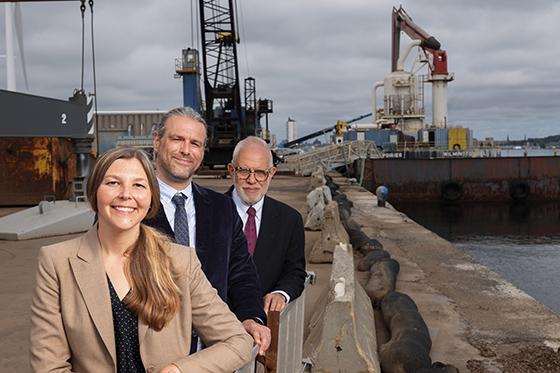
Meet The Editors
The JMLC continues to be a professionally published journal with three Co-Editors-in-Chief: Jonathan Gutoff, Justin Kishbaugh, and Julia Wyman. The JMLC has a rotating staff of other editors and peer-reviewers in the field of maritime law.
Additionally, the JMLC has a cohort of student editors at the Roger Williams University School of Law who assist the Editors-in-Chief.
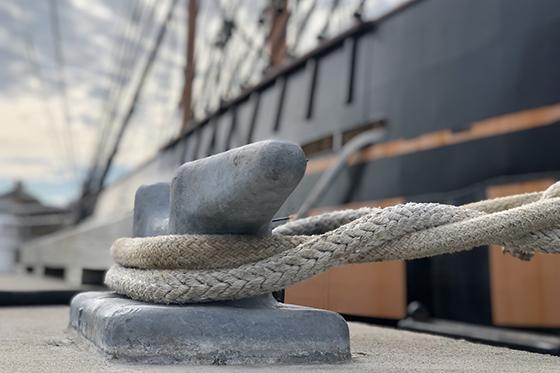
Subscribe to the JMLC
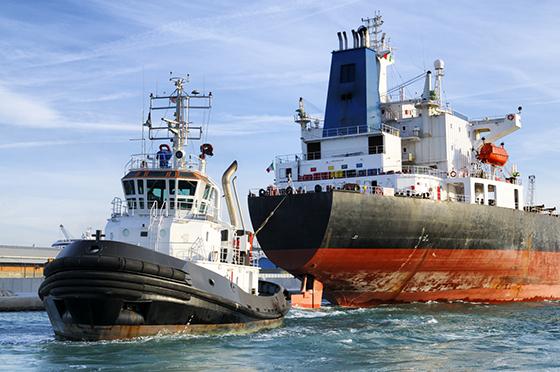
How Do I Get Involved Or Submit An Article?
Submit to the JMLC, become an editor or peer-reviewer, or a student editor.
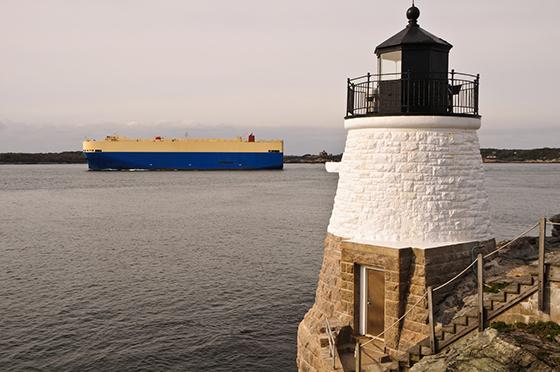
Current & Past Editions
Please check back here for current, past, and upcoming editions of the JMLC.
- Upcoming Issue
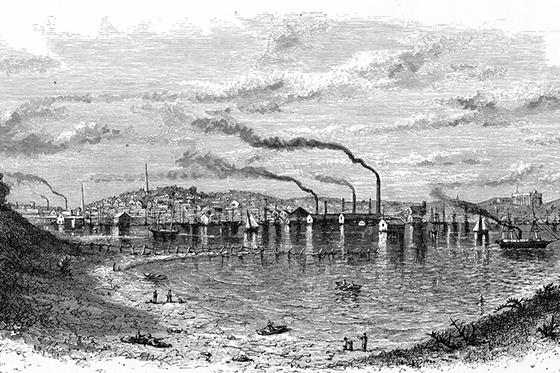
The Journal of Maritime Law and Commerce was founded in 1969 by George Jay Joseph, a Washington, D.C., lawyer who saw the need for a law review exclusively devoted to maritime law. Through a generous gift by the Joseph family in 2021, the JMLC transferred hands to the Roger Williams University School of Law.
- JMLC In The Courts
Marine Affairs News
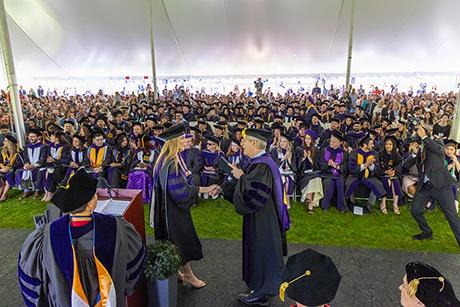
RWU Graduates Encouraged to ‘Be Fearless’ and to Always ‘Seek Knowledge’
Shabana Basij-Rasikh, co-founder of the School of Leadership Afghanistan, delivers Commencement address to RWU’s 1,249 graduates.

Elisabeth D’Amelio Chosen as Class of 2024 Graduate Student Commencement Speaker
BRISTOL, R.I. – Selected as the Graduate Student Commencement Speaker for the Class of 2024, Elisabeth D’Amelio, of Lincoln, R.I., said she knows how easy it is to compare yourself to other people
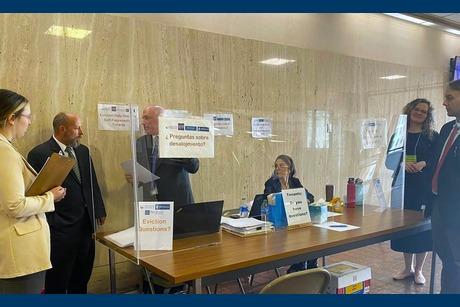
RWU Law Students Go Above and Beyond with Pro Bono
Students recognized for at least 100 hours of pro bono legal service represent RWU Law's strong commitment to the public interest, led by the Feinstein Center for Pro Bono & Experiential Education.
- Accessibility Options:
- Skip to Content
- Skip to Search
- Skip to footer
- Office of Disability Services
- Request Assistance
- 305-284-2374
- High Contrast
- School of Architecture
- College of Arts and Sciences
- Miami Herbert Business School
- School of Communication
- School of Education and Human Development
- College of Engineering
- School of Law
- Rosenstiel School of Marine, Atmospheric, and Earth Science
- Miller School of Medicine
- Frost School of Music
- School of Nursing and Health Studies
- The Graduate School
- Division of Continuing and International Education
- People Search
- Class Search
- IT Help and Support
- Privacy Statement
- Student Life

- Search Site
- Law School Home
- Prospective Students
- Current Students
- Alumni & Giving
- Miami Law: Top 10 Reasons
- Miami – A World of Opportunity
- Careers & Development
- Alumni Network
- Admissions Advice
- Virtual Tour
- Areas of Study
- Experiential Learning
Joint Degrees
- MLS Program
- LLM Programs
- SJD Program
- Plan a Visit
- Recruitment Events
- Request Information
- JD - Juris Doctor
- MLS - Online Master of Legal Studies
- LLM - Master of Laws
- SJD - Doctor of Juridical Science
- Application Status
- Contact Admissions
- Decision Form
- Deposit Deadlines
- Orientation
- Housing & Living in Miami
- Cost of Attendance
- Financing Your Legal Education
- Scholarships
- Get to Know Us
- Pick Your Path
- Admitted Students
- Financial Aid
- Business Law
- Constitutional Law
- Criminal Law
- Entertainment, Arts, and Sports Law
- Environmental Law
- Estate Planning
- Health Care Law
- Human Rights Law
- Immigration Law
- Intellectual Property Law
- International Law
- Litigation, Arbitration and Dispute Resolution
- Maritime Law
- Real Estate Law
- Social Justice and Public Interest
- Technology Law
- J.D. - Juris Doctor Program
- Programs & Areas of Study
Maritime Law: J.D. Area of Study
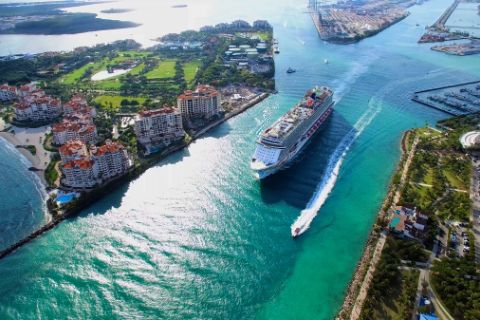
Navigate the Laws of the Sea in the Cruise Capital of the World
Maritime Law combines federal and international laws which govern contracts, offenses, and injuries occurring on, in, or near navigable waters. Our students explore admiralty law, coastal law, international law, and law of the sea and can delve deeper by pursuing an LL.M. in Maritime Law . Students have a unique opportunity to learn from renowned faculty and local maritime legal experts and benefit from our strategic location in Miami, the global headquarters of Carnival, Norwegian, and Royal Caribbean cruise lines. PortMiami, the busiest cruise port in the world, is minutes away from our campus. With more recreational boats registered here than any other state, Florida is the ideal location to study Maritime Law.
Some Facts about Miami and Miami Law :
- Professor Bernard H. Oxman is the only American lawyer ever appointed to serve as judge ad hoc before both the International Tribunal for the Law of the Sea in Hamburg, Germany and at the International Court of Justice at The Hague, Netherlands.
- The LL.M. in Maritime Law one of four programs of its kind in the country and the only one in the state of Florida.
- PortMiami, known as "Cruise Capital of the World,” is the busiest cruise port in the world in both passenger traffic and cruise lines and FL seaports account for the largest tonnage of cargo than any other state.
- Miami Law achieved one of the top 10 highest scores in 2020 the 21st annual International Maritime Law Arbitration Moot .
- Florida has more recreational boats registered than all other 50 states combined.
- Miami Law was chosen to host the Maritime Law Association of the U.S.

Tanner Stiehl, J.D./LL.M. ’21 in Maritime Law Staff Attorney, U.S. Coast Guard Miami, FL
*Course list is not exhaustive and does not set out a path of study.

Jenna Gushue, J.D./LL.M. '13 in Maritime Law Assistant General Counsel, XO Holding Inc.

Academic Programs and Concentrations
J.D./LL.M. - Maritime Law J.D./M.B.A. - Business Administration J.D./M.P.S. - Marine Ecosystems and Society

Brian Sattler, J.D./LL.M. in Maritime Law ‘16 Enforcement Division Chief, U.S. Coast Guard Los Angeles, CA
International Opportunities
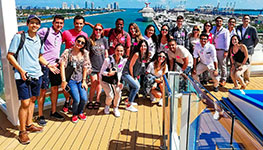
- Cali, Colombia - Maritime and Coastal Legal and Policy Issues Exchange Course with Pontifica Universidad Javeriana
- Perth, Australia - Murdoch University Australia’s International Maritime Law Arbitration Moot Competition
International Moot Court Program - The only one of its kind in the U.S., Miami Law offers a unique and comprehensive program in which students travel and compete, in Spanish and English, in competitions around the world. Some have included:
- International Maritime Law Arbitration Moot Competition
- Judge John R. Brown Admiralty Moot Court Competition
Extracurricular Opportunities
- STUDENT ORGANIZATIONS
- LAW JOURNALS
- Business Law Society
- Charles C. Papy, Jr. Moot Court Board
- International Arbitration Society
- International Law Society
- Maritime Law Society
- Military and National Security Law Society
- The Yvette Ostolaza Mock Trial Team
- Business Law Review
- Inter-American Law Review
- International and Comparative Law Review
- University of Miami Law Review
Faculty Experts
- Raúl J. Chacón Jr. is a partner with the Miami office of Manning Gross + Massenburg LLP. Chacón’s practice focuses primarily on defense of clients in a variety of marine matters, which involve personal injury, products liability, premises liability, and commercial litigation issues.
- Michael Karcher practices in the areas of admiralty and maritime law, specializing in recreational yachts, marine environmental law and insurance issues.

Professor Bernard H. Oxman Richard A. Hausler Professor of Law Director, Maritime Law LL.M. Program
- Bernard H. Oxman is one of the world's top experts on the laws of the sea.
- Robert E. Rosen teaches The Legal Environment of the Cruise Industry.
- Daniel Suman's research focuses on coastal management in Latin America, planning and enforcement in Marine Protected Areas, and public participation in environmental planning.

Denise Krepp, J.D. ‘98 Director’s Action Group, Naval History and Heritage Command Washington, D.C.
Internships and Externships**
**List is not exhaustive and is intended to provide examples of past externships and internships.
Conferences, Lectures, Schools
Keith C. Wold Maritime Law LL.M. Program Teaching Fund - This fund allows Miami Law to bring in the most renowned experts in the fields of international law and law of the sea to lecture. In February 2020, International and humanitarian law expert Claudio M. Grossman presented the lecture, “ The Obligation to Negotiate Access to the Pacific Ocean: The Decision of the International Court of Justice in the case between Bolivia and Chile ."
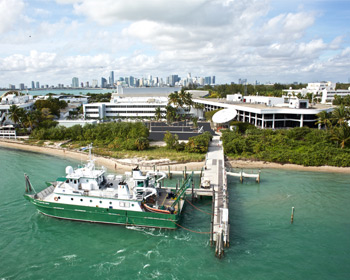
University of Miami School of Law
- 1311 Miller Drive Coral Gables , FL 33146
- [email protected]
- Careers - OCPD
Quick Links
- Academic Calendar - Law School
- Academic Calendar - University
- Events Calendar
- Request Info
Communications
- For the Media
- Web Feedback
- ABA Required Disclosures
- Policies & Privacy Statements
- Visiting the Law School
- Parking & Transportation
- social-facebook
- social-twitter
- social-youtube
- social-instagram
- social-linkedin
- social-flickr
Copyright: 2024 University of Miami. All Rights Reserved. Emergency Information Privacy Statement & Legal Notices
Individuals with disabilities who experience any technology-based barriers accessing the University’s websites or services can visit the Office of Workplace Equity and Inclusion .
- Browse Law Schools
- LLM Articles
- LLM Info Events
- Law School Rankings
- Top 10 Lists
- LLM Scholarships
- LLM Discussions
- Application Tracker
- Advanced LLM Search
- UK / Ireland
- Australia / New Zealand
- Canada & Latin America
- Africa / Middle East
By Concentration
- General LL.M. Programs
- Alternative Dispute Resolution / Arbitration / Mediation
- American Law / U.S. Law
- Banking Law / Finance Law / Securities Law
- Business Law / Commercial Law
- Corporate Law / Company Law
- Human Rights
All Resources
- Top LL.M.s for Maritime Law

Top LL.M. Programs for Maritime/Admiralty Law 2024
Maritime law—sometimes known as admiralty law—regulates activities that take place on the sea. Many countries have their own laws which govern maritime activities within their borders, but there are also various treaties and conventions which provide a framework for international maritime laws. Students pursuing an LL.M. in Maritime or Admiralty Law will be exposed to a number of issues important in the field, including regulation of shipping, marine insurance, and international trade.
And increasingly, LL.M.s inMaritime Law are also exploring related topics, such as marine pollution and climate change. An LL.M. in Maritime Law can prepare grads for a variety of jobs, including maritime specialists in private law firms, legal analysts at maritime insurance firms, or positions at international bodies. As the maritime industry continues to evolve and face new challenges, the demand for legal experts in this field is expected to grow.
If you're considering a career in maritime law, exploring the top LL.M. programs in Maritime Law can provide you with the specialized knowledge and skills needed to succeed in this dynamic and multifaceted field. From studying international conventions to analyzing case studies in marine insurance, these programs offer comprehensive education and practical training to prepare you for a rewarding career in maritime law.

Home to a sizable port, the city of Swansea has long had a connection to the sea. This relationship has also been embraced by the school, which has a strong reputation for maritime law and hosts the Institute for International Shipping and Trade Law. The school offers an LL.M. in International Maritime Law, plus one in International Commercial and Maritime Law.

Founded in 1982, the school’s Institute of Maritime Law explores various research topics in the field. Students pursuing the schools highly-regarded LL.M. in Maritime Law study near one of the United Kingdom’s biggest ports.

Even though in the US there are very few LL.M.s in Maritime Law—Tulane is one of only a handful of law schools in the country offering an LL.M. in Admiralty—lack of competition doesn’t mean that it’s subpar. On the contrary, the school’s LL.M. in Admiralty is highly-regarded, in the US and internationally. The school also runs the Maritime Law Center and offers a specialized JD program in Admiralty.

NUS’ Centre for Maritime Law—one of the few maritime law research centers in the Asia-Pacific region—puts on relevant events and publishes research. LL.M. students can pursue a concentration in Maritime Law; Singapore, one of the world’s busiest shipping hubs, is a great place to study for those with interest in the field.

Students looking to study maritime law in Scandinavia can choose Oslo’s LL.M. in Maritime Law, which addresses a range of topics, such as shipping law, attacks on vessels, and the effects of the global financial situation on the shipping industry. The school hosts the Scandinavian Institute of Maritime Law, which has been fostering expertise in the space since 1963.

Situated along an active shipping lane, Cape Town is a great place for LL.M. students to see how maritime law works in the real world. The school also hosts the Institute of Marine & Environmental Law, which produces relevant research and teaches courses on the school’s LL.M. in Marine & Environmental Law.
Established in 1988 under the auspices of a specialized agency of the United Nations, the IMLI serves as a research and training hub for maritime law. While at first, IMLI's LL.M. in International Maritime Institute was designed for those from developing countries, it has evolved to help students from all over the world specialize in Maritime law. The LL.M. covers topics in shipping, public international law, international organizations, and more.

Located in Halifax—one of Canada’s biggest port cities—Dalhousie runs the Marine & Environmental Law Institute, which has carved out a research niche in maritime law. Although the school doesn’t offer a specialized LL.M. in Maritime Law, interested students can pursue a range of electives in both marine and environmental law.

Students interested in the field can study City’s Maritime Law LL.M. The school administers the London Universities Maritime Law and Policy Research Group, and faculty produce research in maritime law.

The school offers an LL.M. specialization in Ocean Law and Policy, which is supported by the university’s School of Ocean and Earth Science and Technology. Along with several other schools at the university, the Richardson School of Law has established the Center of Island Climate Adaptation and Policy, which publishes relevant research and puts on events.
Related LLM News

LLM GUIDE Updates Top LL.M. Lists by Speciality for 2021
May 31, 2021
More LLM News
Featured Schools

At the University of Cincinnati, International students can study US Law

Full-time and Part-time LLM; JD for Foreign Lawyers

LL.M. programs for international students
Related Articles
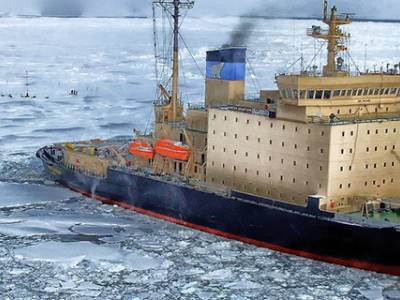
A Degree for the High Seas: A Look at Maritime LL.M.s
Jun 29, 2015
With burgeoning global trade and evolving issues like piracy and oil spills, maritime law is an evergreen field for young law graduates
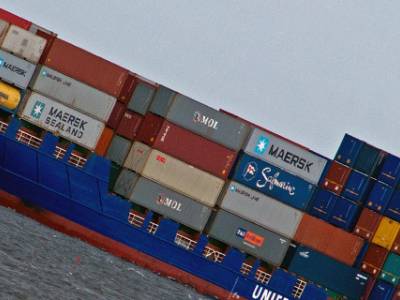
5 Questions for an LL.M. Graduate David Vajnai
Sep 15, 2014
Swansea University, LL.M. in International Maritime Law, 2011-12
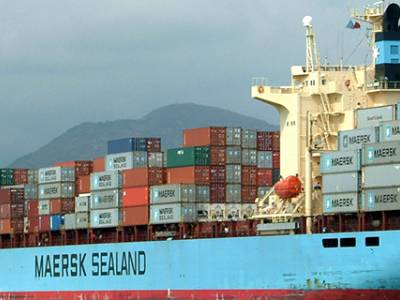
The LL.M. in Maritime Law
Jan 26, 2009
Postgraduate programs remain a key port of call for careers in one of the oldest fields of law.
More Articles
More Top 10 Lists

Related Discussions
Go to LLM GUIDE Discussion Board
These unordered lists were compiled by LLM GUIDE's editors, taking to account existing rankings and other factors. Read more on the Methodology page
To read about rankings, see LLM GUIDE's Law School Rankings page.
- What is an LL.M.?
- Funding Your LL.M.
- How Do I Prepare For An LL.M.?
- Is an LL.M. Right for Me?
- Law School Glossary
- LL.M. Basics: Types of Law Degrees
- LL.M. Essential Facts
- What are the TOEFL and IELTS?
- What Do I Need to Apply for an LL.M. Program?
- What is an LL.M. Concentration?
- What Kind of LL.M. Program is Right for Me?
- Where Should I Do My LL.M.?
- Which Law School?
- Why Should I do an LL.M.?

More Top Lists

- Terms of Use
- Cookie Policy
- Privacy Policy
Information
- Featured LLM Programs
- MBA Programs
- Online MBA Programs
- Executive Courses
Search LLM Programs
Go to Advanced Search
Subscribe to the LLM GUIDE Newsletter
Receive the latest news and tips
© 2001–2024 Pritzwalks – LLM GUIDE – Master of Laws (LL.M.) Programs Worldwide

Turkish Ship Owner Plead Guilty to Environmental Crimes, Fined $2 Million in New Orleans
I n a significant development in the realm of maritime environmental law, two related companies, Prive Overseas Marine LLC and Prive Shipping Denizcilik Ticaret, have pleaded guilty to environmental crimes. The companies operated the motor tanker PS Dream, which has now become the center of a high-profile legal case.
Charges and Violations
The charges against the companies include conspiracy, knowingly violating the Act to Prevent Pollution from Ships (APPS), and obstruction of justice. These charges are related to the falsification of the tanker’s Oil Record Book, a required log that records all operations related to oil in machinery spaces.
The case came to light when a crew member reported a video showing oil being pumped overboard and trailing behind the tanker. This act is a direct violation of APPS, which prohibits the discharge of oil or oily mixtures into the sea from ships, unless certain conditions are met.
Legal Proceedings and Penalties
The guilty pleas were submitted in federal court in New Orleans before Chief U.S. District Court Judge Nannette Jolivette Brown. If the court approves the plea agreement, the companies will face a total fine of $2 million and a four-year probation period. This hefty fine underscores the seriousness with which such environmental crimes are treated.
Further charges have been filed against Captain Abdurrahman Korkmaz, a Turkish national who was the ship’s master. The charges against the captain highlight the individual accountability that can be enforced in such cases, in addition to corporate responsibility.
Environmental Responsibilities in the Maritime Industry
This case serves as a stark reminder of the environmental responsibilities that come with operating commercial vessels. The maritime industry has a significant impact on the environment, particularly in terms of air and water pollution. As such, strict regulations are in place to mitigate this impact and ensure the sustainability of our oceans.
The Act to Prevent Pollution from Ships is one such regulation. It enforces the provisions of the International Convention for the Prevention of Pollution from Ships (MARPOL), the primary international agreement aimed at preventing marine pollution caused by ships, whether through operational or accidental means.
The Impact of the Case
The case of the PS Dream is a clear demonstration of the commitment of the Justice Department to prosecute those who violate maritime laws intended to prevent pollution from ships. It sends a strong message to other operators in the industry about the consequences of non-compliance with environmental regulations.
This case also highlights the importance of whistleblowers in uncovering environmental crimes. The crew member who reported the video played a crucial role in bringing these violations to light. This underscores the need for a culture of transparency and accountability within the maritime industry.
The Role of Whistleblowers
Whistleblowers play a critical role in the enforcement of environmental laws and regulations. In this case, the crew member who reported the video of oil being discharged into the sea was instrumental in bringing the violations to the attention of the authorities. This highlights the importance of creating a safe and supportive environment for whistleblowers in the maritime industry.
The Future of Maritime Environmental Law
The case of the PS Dream is likely to have far-reaching implications for the maritime industry. It serves as a stark reminder of the severe penalties that can be imposed for violations of environmental laws and regulations. It also underscores the importance of maintaining accurate records and logs, as falsification of these documents can lead to additional charges and penalties.
In conclusion, the guilty plea of the companies operating the PS Dream marks a significant milestone in the enforcement of maritime environmental law . It underscores the importance of adhering to environmental regulations and the severe consequences that can result from violations. As we move towards a more sustainable future, it is crucial that all stakeholders in the maritime industry, from operators to crew members, understand and uphold their environmental responsibilities.
![In a significant development in the realm of maritime environmental law, two related companies, Prive Overseas Marine LLC and Prive Shipping Denizcilik Ticaret, have pleaded guilty to environmental crimes. The companies operated the motor tanker PS Dream, which has now become the center of a high-profile legal case. Charges and Violations The charges against the […] In a significant development in the realm of maritime environmental law, two related companies, Prive Overseas Marine LLC and Prive Shipping Denizcilik Ticaret, have pleaded guilty to environmental crimes. The companies operated the motor tanker PS Dream, which has now become the center of a high-profile legal case. Charges and Violations The charges against the […]](https://img-s-msn-com.akamaized.net/tenant/amp/entityid/BB1mPwq4.img?w=500&h=500&m=6)
Home > LL.M. Programme
LL.M. Programme
Description, academic requirements, financial support, how to apply.
The Master of Laws (LL.M.) in International Maritime Law consists of post-graduate education in all areas of international maritime law, including law of the sea, shipping law, maritime security law and marine environmental law (please click here for the detailed programme structure) . The programme is also designed to provide specialized training in the development and drafting of maritime legislation which incorporates and effectively implements an international instrument, especially IMO treaties, into domestic legislation. Intensive drafting exercises are carried out taking into account both the international nature of treaty rules as well as national maritime policies and objectives.
The Institute's resident faculty is responsible for the teaching of all subjects with the Institute’s academic syllabi. The teaching of the resident faculty is complemented by the Distinguished Visiting Fellows Programme which aims to introduce students to the latest developments and offers networking opportunities which should serve students well when they return to their home countries. Distinguished visiting fellows come from leading universities, while others came from international institutions such as the IMO, the International Oil Pollution Compensation Funds (IOPC), the International Tribunal for the Law of the Sea (ITLOS), the International Court of Justice (ICJ), the Food and Agriculture Organization of the United Nations (FAO), the International Law Commission (ILC), the Comité Maritime International (CMI), and the International Chamber of Shipping (ICS). Other visiting fellows include eminent practitioners, diplomats and leading personalities in the maritime industry.
As part of the programme, students also take part in field study visits that link theoretical knowledge to practical experience. Typical destinations include shipyards, port terminals, training simulator centres and commercial and war ships. Students also receive complimentary attendance at the international conferences organized annually at IMLI. At the end of programme, the Institute organizes a field trip to London where the newly graduated participants visit important maritime institutions, including IMO where they have the opportunity to meet again the IMO Secretary-General, senior IMO officials and geographical point representatives.
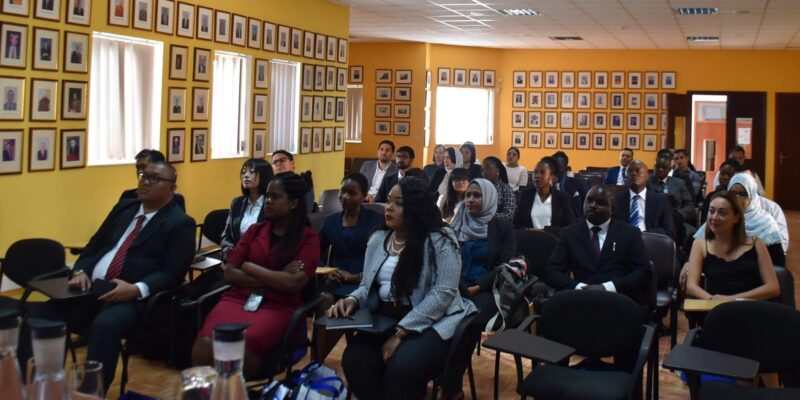
Inaugural Lecture for Academic Year 2019 / 2020
The LL.M. programme is an exciting inter–cultural journey as the Institute draws candidates from across the globe. IMLI promotes a spirit of mutual understanding and cooperation between cultures, paving the way for future collaboration between graduates in combining efforts towards maritime law unification.
The programme is mainly addressed to lawyers, legal advisers, judges and legal draftsmen and women whose duties encompass maritime issues and who are seeking a specialisation in maritime law. The programme is also open to law graduates of any country who intend to pursue a legal career in the field of maritime law whether in the public or private sectors, whether in practice, administration or academia. In order to promote the integration of women in the maritime sector, fifty percent of the places in the programme are reserved for suitably qualified women candidates.
Candidates for the programme are usually officially nominated by their governments or national administrations. The Institute also considers applications from independent candidates. It is generally recognized that in a large number of developing States there are very few lawyers with specialized knowledge of maritime law. Consequently, the availability of well-trained maritime lawyers enables these States to review and update their maritime legislation in accordance with international rules and prescriptions.
Students are assessed on the basis of their performance throughout the year, the results of two written examinations, an individual 10,000-word supervised dissertation and a maritime legislation drafting project. Candidates who successfully complete the programme are awarded the degree of Master of Laws in International Maritime Law. The teaching in the programme as well as the preparation of assignments, dissertation and maritime legislation drafting project is in the English language.
The Institute will consider the applications of candidates who meet its academic requirements, which are:
a) a degree in law with a high standing from a recognized university;
b) proficiency in the English language (see the full proficiency of English language requirements below); and
c) computer competence (at least the ability to use Microsoft Office). Computer competence is essential as students are required to use computers to carry out research and to complete their assignments and academic projects. In addition, computer competence is important in the event the Institute holds examinations online.
Proficiency of English Language
All students must be fully proficient in the English language by the time they begin their studies. This means that they should be fully acquainted with the fundamentals of the English language, i.e. in reading, writing, listening, comprehension and speaking skills. Students who have not studied or made active use of the English language in recent years are STRONGLY advised to refresh their English knowledge PRIOR to their arrival in Malta. They should bear in mind that the study of international maritime law in the English language demands a sophisticated knowledge of the language. Production of evidence of English language proficiency is required. Therefore, as a pre-requisite for the admission, the Institute may require candidates to undertake one of the following tests:
INTERNATIONAL ENGLISH LANGUAGE TESTING SYSTEM (IELTS)
Administered on demand at local British Council offices / British Embassies. Further information on the International English Language Testing System (IELTS) can be found at http://www.ielts.org . A pass above band 6 means the student can participate fully in the programme.
CAMBRIDGE CERTIFICATE OF PROFICIENCY
Further information on the Cambridge Certificate of Proficiency may be obtained by contacting British Embassies/Consulates or the British Council, the Institute, or by visiting the following website: http://www.cambridgeenglish.org/exams/proficiency . A pass level means that the student can participate fully in the programme.
TEST OF ENGLISH AS A FOREIGN LANGUAGE (TOEFL)
Further information on the Test of English as a Foreign Language (TOEFL) may be obtained through American Embassies / Consulates or the U.S. Information Agency, or by visiting the following website http://www.toefl.org . A pass above 600 or above 227 CBT or above 87 IBT means that the student can participate fully in the programme.
If the test taken is not one of the above, the score, together with reference material on the system used, may be sent to the Institute for evaluation and advice. A certified copy of the test results should be sent to the Institute along with the application. Further, the Institute reserves the right to conduct online interviews with candidates applying to the programme to assess their level of English in order to ensure that they have the command necessary to undertake and successfully complete the programme.
COMMON EUROPEAN FRAMEWORK OF REFERENCE FOR LANGUAGES (CEFR)
Further information on the CEFR may be obtained by visiting the following website: https://www.coe.int/en/web/common-european-framework-reference-languages/level-descriptions. A B2 level means that the student can participate fully in the programme.
Programme Fee
Information on the programme fee can be found in the application package.
Candidates are required to have financing for their enrolment in the programme. Candidates are therefore strongly advised to explore all funding possibilities in their home countries, including seeking sponsorship from companies or organizations for which they work or applying for national or international fellowship programmes. The IMLI website provides a list of some of the entities which have offered financial support in the past.
Payments should be remitted to the Institute's bank account (transfer charges are to be borne by the applicant). Details are as follows:
Account Name: IMO International Maritime Law Institute Address: University of Malta Campus, Msida MSD 2080, Malta Telephone #: (356) 2131 9343 Account #: 4001 3713 797 Bank Name: Bank of Valletta Bank Branch Name: L-Ibrag Branch Bank Address: Triq Tal-Ibrag, Tal-Ibrag, Is-Swieqi. SWQ 2030 IBAN: MT58 VALL 2201 3000 0000 4001 3713 797 SWIFT Code: VALLMTMT Currency: EURO

Although the Institute does not offer fellowships, it is willing to approach fellowship donors who sponsor the full studies of a limited number of deserving government-nominated candidates. For this reason, a government entity must nominate the candidate to the programme. Such candidates should normally be persons already serving in or intended to be appointed to a Government Ministry or Department concerned with legal, port or shipping affairs, or an organization in the country of the nominating Government involved in these matters.
By nominating the candidate to the programme, the nominating authority must submit a duly completed nomination form wherein it includes the request for financial support. Applications which are not accompanied by this nomination form, will not be considered by the Institute. In addition, candidates applying for a fellowship will need to complete the fellowship application form and submit proof of payment of the fellowship application fee.
By submitting an application and nominating a person for studies at the Institute, both the applicant and the nominating authority are confirming that they are aware of the national legislative and/or administrative requirements which have to be met by selected applicants, prior to travelling to the Institute and commencing their studies; that the aforesaid requirements are met for the duration of their studies; and that they will promptly take the actions required to comply with these requirements.
It should be noted that donors have their own selection criteria when considering candidates applying for a fellowship. Generally donors prefer young and talented candidates (under the age of 40) from developing countries – including Small Island Developing States and Least Developed Countries – who have a strong motivation to work for their government and who, upon completion of their studies, will make a vital contribution to the development of the national legal framework and maritime sector.
In line with the Institute’s policy to ensure gender equality and equal access to education to female candidates, fifty percent of the places available are reserved for deserving women candidates.
Fellowship donors for the year 2019 included:
The Nippon Foundation of Japan
International Maritime Organization
Lloyd’s Register Foundation
ITF Seafarers’ Trust
Government of Malaysia
Government of Saudi Arabia
Government of Malta
Government of Ghana
All applications for a fellowship must be processed through the Institute. Applicants and nominating authorities shall not approach donors directly with application packages.
Candidates who have been awarded a fellowship, will also be required to pay a refundable deposit of Euro 500 within the deadline stipulated by the Institute. Said deposit will be returned to the candidate on completion of studies at IMLI.
Whatever the source of funding for the programme fee, candidates are reminded that the programme fee does not cover travel expenses. Travel arrangements will have to be arranged and settled by the participants and/or their nominating authorities.
Whatever the source of funding for the programme fee, candidates are reminded that the programme fee does not cover health insurance. Candidates admitted to the programme are required to have a health insurance for the whole duration of their stay in Malta with cover for hospital care. Evidence of this insurance may be required by the relevant Embassy when the student applies for an entry visa. However, health insurance is mandatory when candidates admitted to the programme apply in Malta for a study residence permit. Should admitted candidates find difficulty in obtaining insurance which cover extends for the whole duration of their stay in Malta, the Institute can assist in obtaining locally the required health insurance when the admitted candidate arrives in Malta.
For further details, please contact:
Ms. Anusha Fernando
Admissions officer, imo international maritime law institute, university of malta campus, triq roberto ranieri costaguti, msida msd 2080, tel.: +356 21 319343, 21 310816, ext. 107, fax: +356 21 343092.
E-mail: [email protected]
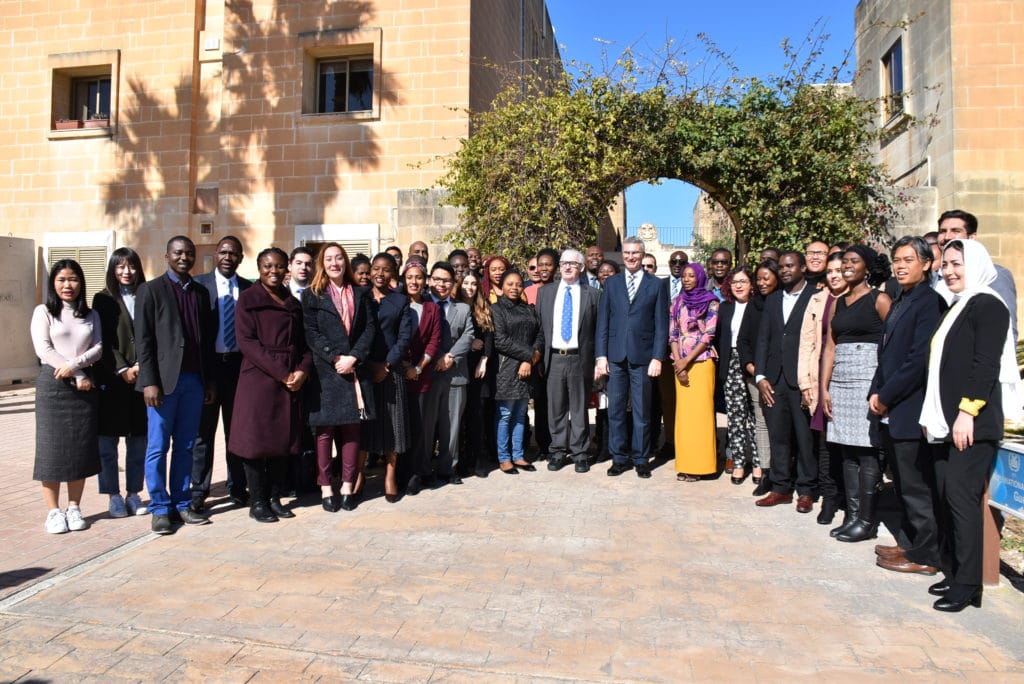
All candidates must complete the Application Form. This form must be accompanied by:
(a) copies of the University degrees held by the candidate officially authenticated by the University concerned;
(b) a copy of the certificate of proficiency in English;
(c) the Medical Report Form duly completed by a registered Government Medical Practitioner;
(d) a letter of intent written by the candidate stating the candidate’s reasons for applying to the programme and his/her career objective. Candidates may use the Motivation Form included in the Application Package;
(e) two letters of reference covering the candidate’s ability to undertake the programme. Referees should be persons who are not related to the candidate and who are familiar with the candidate’s character and qualifications. Referees should use, where possible, the Reference Form provided in the Application Package;
(d) a non-refundable application and processing fee of €150;
Candidates who require financial assistance must complete the nominated candidate application package and must also submit the following documents:
(a) the Nomination Form duly completed, signed and stamped by the nominating authority;
(b) the fellowship application form duly completed and signed by the applicant and the nominating authority.
(c) a non-refundable fellowship application fee of €200. This fellowship application fee is in addition to the processing fee of €150 provided for in paragraph (d) above. The fellowship application fee covers all administration costs incurred in approaching potential sponsors and seeking fellowship funding for the candidates.
When all the criteria for admission, including clearance and confirmation of financing, have been met, the candidate and the nominating authority (where applicable) shall be notified in writing that the candidate has been selected for admission to the programme.
The Institute must receive from the candidate and his/her nominating authority (where applicable) a confirmation in writing as to whether the candidate is ready to join the programme, whereupon the candidate will be admitted to the programme.
Ms. Anusha Fernando
Tel.: +356 21 319343, 310816, ext. 107.
E-mail: [email protected]
All applications should be type-written and sent to:
The Director
Downloadable Application Package for the 2024-2025 - LL.M. Programme :
Nominated Candidates
Self-financed Candidates
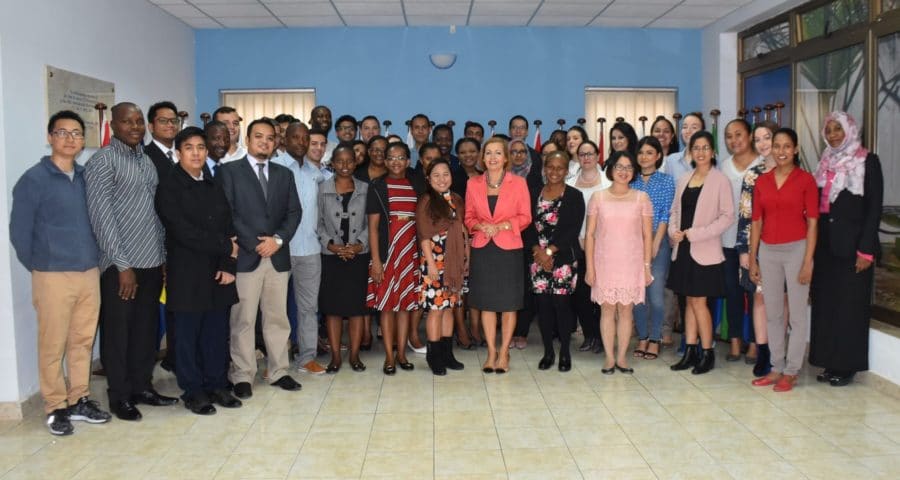
Hello. You're getting this layout because you're using an obsolete web browser. Please upgrade it , to get the full flavor.
maritime law virtual database, sea carriage.
Administration of the Territory of Papua and New Guinea v China Navigation Ltd [1967- 68] PNGLR 239 (1 December 1967)
Sea Carriage- Loss of goods unshipped under Collector’s Permit
The defendant carrier shipped the plaintiff’s goods from Sydney to Port Moresby. On arrival the goods were unshipped and landed under a Collector’s permit pursuant to provisions of the Custom’s Ordinance 1951-1962. The goods were placed in a place of security approved by the collector. While in this storage a portion of the goods were unlawfully taken. The plaintiff commenced an action against the carrier claiming damages for breach of contract of carriage by sea alleging failure to keep safely and take care of the cargo. The defendant submitted that the loss arose after the completion of the discharge of the cargo from the ship. The Hague Rules were applicable to the bills of lading but any liability under those rules arose from the time the goods were loaded until they are unshipped from the vessel. The parties had also included an exemption in the bill of lading limiting the liability of the defendant once the goods were unshipped. The defendant relied on s.69 of the Custom’s Ordinance 1951-1962 which stated: “Goods unshipped and landed under a Collector’s permit shall be placed by, and at the expense of, the master or owner of the ship or the pilot or owner of the aircraft from which they were unshipped, in a place of security approved by the Collector and shall, until lawfully removed from that place, be at the risk of the master or owner of the ship or the pilot or owner of the aircraft as if they had not been unshipped.” DECISION: Claim dismissed. HELD: Section 69 must be read in the context of the Custom’s Ordinance 1951-1962. The risk being referred to in s.69 is liability to duty owed under the Ordinance. The Ordinance cannot have the effect of imposing a liability on the carrier over and above and in direct contradiction to those liabilities contained in the contract of carriage.
Belae v Markwarth Shipping Company Ltd [1981] SBHC 10; [1980-1981] SILR 218 (23 October 1981)
Sea Carriage- Cargo Receipt not a contract of carriage for the purposes of the Carriage of Goods by Sea Act.
The Appellant had goods dispatched to himself on a vessel operated by the Respondent. The seller of the goods handed the goods over to the Respondent for shipping to the Appellant. On receipt of the goods, the Respondent gave the seller a document entitled ‘Cargo Receipt’. It was agreed that in arranging the shipment of the goods the seller acted as an agent for the Appellant. When the vessel arrived at the location of the Appellant some of the merchandise had gone missing. The appellant issued a writ of summons. At the hearing the Magistrate found in favour of the defendant carrier. The carrier relied on a limitation clause printed on the back of the Cargo Receipt which provided that the shipper must notify the carrier of a loss within one month of shipment. The Magistrate found that the Cargo Receipt did not incorporate the terms of the contract between the parties as that document was not brought to the attention of the shipper or his agent before the contract was concluded. However, the Magistrate gave judgement for the carrier on the basis of the time limitation set out in the Carriage of Goods by Sea Act (chapter 103). The shipper appealed. DECISION: Appeal allowed. HELD: The Cargo Receipt was not a contract of carriage as defined by the Carriage of Goods by Sea Act, and thus the defence of limitation was not available to the carrier. A bill of lading as defined by the act is a document of title and the Cargo Receipt expressly stated that it did not constitute a bill of lading or a document of title to the goods.
Burns Philp (South Seas) Company Ltd v Marine Pacific Ltd [1979] FJCA 4; Civil Appeal No 07 of 1979 (25 July 1979) aff’g.
Burns Philp (South Sea) Company Ltd v Marine Pacific Ltd [1979] FJSC 9; [1979] 25 FLR 57 (16 January 1979).
Sea Carriage- Bill of Lading- Contract for Carriage of Goods by Sea- Deck cargo lost at sea; excluded by Bill of Lading
The plaintiff contracted with the defendant to ship cargo from Suva to Labasa. The cargo was carried on the deck of a barge and when the barge was damaged during the voyage, the cargo was lost. The bill of lading was stamped with a clause stating: “cargo carried on deck at shipper’s risk without responsibility for loss or damage howsoever caused”. Condition 26 of the bill of lading provided that “all goods shipped as deck cargo to be carried at owner’s risk”. The bill of lading contained a clause subjecting it to the rules in the Sea Carriage of Goods Ordinance Cap. 207. The plaintiff claimed a breach of contractual duty by the defendant in failing to ensure that the cargo was properly secured, and in failing to deliver the cargo. The plaintiff also claimed a breach of duty under the Sea Carriage of Goods Ordinance. The defendant denied the claims and claimed protection of the exclusion clause inserted by the parties inthe bill of lading. DECISION: Plaintiff’s claim dismissed. HELD: The Court said that the bill of lading did stipulate that the rules in the Ordinance did apply. As a result, Condition 26 of the bill of lading on its own would be without effect- by virtue of the application of Article III of the rules which defines the responsibilities and liabilities of the parties. However, the rules apply to “goods” defined as “goods, wares, merchandise and articles of every kind whatsoever, except live animals and cargo which by the contract of carriage is stated as being carried on deck and is so carried”. Thus to escape the operation of the rules the goods must not only be carried on deck, but it must be stated in the bill of lading that the goods are to be carried on deck. The stamped clause in this case fit this exception to the application of the rules, and effectively limited the liability of the carrier. The plaintiff argued that the stamped clause was not wide enough to exclude negligence, and that negligence must be expressly included in the wording of the clause. The court reasoned that the effect of the clause was to change the liability of the carrier from that of a common carrier to a carrier only under an obligation to take reasonable care. There had been no fundamental breach of contract, and to hold the defendant liable would be to deprive the exclusion clause of all of its content. APPEAL: The plaintiff appealed the decision on the grounds that the lower court should have taken a stricter interpretation of the exclusion clause; and that the defendant had failed to prove that it was not guilty of any fundamental breach. The appeal was dismissed. The plaintiff had not pled fundamental breach. As to the appellant’s argument that the onus was on the respondent to show what had happened to the goods, the Appeal Court found that the appellant had already stated in its Statement of Claim that the goods had been washed overboard. Failure to deliver the goods per se did not suffice to show fundamental breach without evidence that the loss had been caused by some act outside of the contract of carriage. As to the lower court’s interpretation of the clause, the Appeal Court agreed that the Ordinance did not apply to these goods because of the stamped clause on the bill of lading. The clause was an express stipulation in the contract of affreightment which effectively altered the liability of the carrier. The words were wide enough to encompass negligence; and because of other limits to liability clauses contained in the bill of lading the clause would be without effect if it did not include negligence.
Danzas Pty Ltd v Williams & Gosling Ltd [1994] FJHC 113; Hbc0276.91s (7 September 1994)
Sea Carriage- Bill of Lading- Waybill- Custom- exceptional C.O.D. consignment requires forewarning
The plaintiff and defendant are freight forwarding companies; the plaintiff in Australia and the defendant in Fiji. The parties had a longstanding business relationship. In this instance the plaintiff took delivery of leather from Italy and shipped it to Fiji. The shipment was consigned to the defendant under cover of a waybill. With the shipment were 2 further waybills issued by the plaintiff and naming the Italian suppliers as the shippers and Island Furniture and the 3rd party as consignees. The latter waybills contained special instructions- there was to be C.O.D. payment before the goods were released. There were additional written instructions as to the required C.O.D. payment on the waybill. The consignments went to Island Furniture without payment. The leather was made into furniture which was sent to Australia and subsequently Island Furniture went into receivership. The plaintiff issued proceedings against the defendant seeking damages for breach of contract and negligence. The defendant denied liability, but in case of liability sought indemnity from the 3rd party on the basis that the leather shipment had been consigned to the 3rd party. DECISION: Judgement for the plaintiff for 75% of claim; 3rd party claim dismissed. HELD: The plaintiff and defendant were bound contractually by an agency relationship. On this basis the defendant owed to the plaintiff a duty of care in tort and contract. The court found that the defendant had in fact not complied with the instructions on the waybill and had breached its duty to the plaintiff in contract and in tort. However, the court also found that C.O.D. consignments are very rare in Fiji and therefore the plaintiff should have forewarned the defendant about the exceptional consignment. For this reason the plaintiff was found partly responsible for its loss. The 3rd party claim failed on the pleadings. The defendant based its claim on the 3rd party ordering the goods but should have based its claim on the 3rd party’s assignment of the goods after it had accepted consignment from the defendant.
Finch v Seafreight Pty Ltd [1976] PGNC 23; [1976] PNGLR 440 (6 October 1976)
Sea Carriage- Loss in transit- Protective provisions of the Sea Carriage of Goods Act 1951- Onus of proof
The plaintiff shipped 2 crates of personal possessions from Loloho to Port Moresby on one of the defendant’s ships. The goods were lost. The plaintiff sought damages for breach of duty of carriage, storage and delivery of goods by sea. A judgement in default was entered against the defendant. On the assessment of damages the defendant argued that its liability was limited by Art. IV r 5 in the 2nd schedule of the Sea Carriage of Goods Act 1951. DECISION: For the plaintiff HELD: The court looked to the definition of “carriage of goods” in the Sea Carriage of Goods Act 1951. The period covered was from the time the goods were loaded until the goods were discharged from the ship. The onus was on the defendant to show that the loss occurred during this period in order to come within the clause and limit their liability. Because a default judgement had been entered the defendant could not seek to limit its liability by reliance on the exclusion clause in the Bill of Lading.
Hauhaea v Laurabada Shipping Services Ltd [2005] PGDC 31; DC200 (13 July 2005)
Sea Carriage- Bill of Lading- Action for loss of goods- Onus
The plaintiff arranged with the defendant company to ship his goods on two occasions. On both occasions a portion of the shipment was not received by the plaintiff and recorded as lost. The plaintiff sought to recover for these losses on the contract of carriage contained in the Bill of Lading. The complainant argued that the goods were not lost before loading or after discharge from the ship. DECISION: Claim dismissed. HELD: Clause 6 of the Bill of Lading expressly limits the liability of the defendant to losses incurred during the time that the goods were on the ship. As such the onus is on the plaintiff to prove that the loss occurred during the period from when the goods were loaded to the time the goods were discharged as per the Sea Carriage of Goods Act 1951. The plaintiff failed to discharge the onus.
Hunt v Australasian United Steam Navigation Company Ltd [1919] FJSC 1; [1919] 2 FLR 72 (1 January 1919); aff’d on appeal to Privy Council (17 June, 1921) LRAC 1921, vol. 2, 351.
Maritime Torts- Negligence and Breach of duty- Cargo damaged as a result of malfunctioning insulating apparatus; Seaworthiness of vessel implied warranty in bill of lading
The plaintiff shipped a load of fruit from Fiji to Australia. On arrival the bananas which had been carried in the insulating chamber of the vessel were damaged and the plaintiff suffered damage as a result. The plaintiff alleged that the insulating machinery was not operating properly. The bill of lading implied a warranty of seaworthiness and the plaintiffs claimed for damages for negligence and breach of duty. DECISION: Damages awarded to the plaintiff. HELD: By section 7(1) of Ordinance No. 1 of 1926 every bill of lading has an implied warranty that the ship is seaworthy at the beginning of the voyage. To recover the plaintiff must satisfy the court that the fruit was shipped in good condition and properly packed. The defendant must satisfy the court that the insulating apparatus was in good working order. The court found that the insulating apparatus was not in working order and this went to the seaworthiness of the vessel. The bill of lading stipulates that the plaintiff must give notice of his claim within 7 days of arrival at the port of discharge. This clause did not apply because the damage was due to the unseaworthiness of the vessel. The bill of lading contained no stipulation as to seaworthiness so that was implied by s.7(1). In that case the express terms of the bill of lading did not apply to the implied contract.
International Watersport Management Ltd v Pearl Creations Company Ltd [2002] TOCA 7; CA 10 2002 (23 July 2002)
Sea Carriage- Charter- Authority of master to contract for the carriage of goods in the course of the business of the vessel.
The appeal arose out of the spoiling of a cargo of live oysters carried by a vessel owned by the appellant. The respondent chartered the appellant’s vessel to transport the oysters. At the trial it was established that the duration of the voyage as well as the temperature were crucial to the preservation of the cargo of live oysters. The respondent spoke with the master of the vessel who stated that the voyage could be made in 8-10 hours overnight. The respondent then met with the managing director of the appellant and arranged for the charter and the payment. The lower court found that the duration of the voyage was not part of the oral contract between the appellant and respondent. Prior to the voyage the master arranged for pilotage for his arrival at his destination in 10 hours. The lower court inferred that the duration of the voyage and the pilotage had been left by the appellant for the master to settle and once settled became terms of the contract between the parties. The owner of the vessel appealed. DECISION: Appeal dismissed. HELD: The owner could not claim the freight and at the same time repudiate the terms on which the cargo had been received. The owner was aware that the master would arrange pilotage on arrival and therefore duration of the voyage. It is settled law that the master has the authority to contract for the carriage of goods in the course of the business of the vessel.
Maharaj v Burns Philip (SS) Company Ltd [1994] FJHC 56; Hbc0178j.89s (3 June 1994)
Sea Carriage- Company which arranges shipment has no duty of care outside of contract.
The defendant company arranged for the shipment of the plaintiff’s vehicle from Suva to Sydney. The vehicle was extensively damaged on the voyage and the plaintiff brought a claim for damages for negligence and for breach of contract. DECISION: Claim dismissed. HELD: The plaintiff did not have a claim in tort. The liability arose out of the contract and there was no duty of care owed outside of the contract. The plaintiff was an ‘arranger’ only by the terms of the contract, and was not liable for the failings of the shipper.
Pimco Shipping Pty Ltd v Moeder, Hermann and Moeher Trading Pty Ltd [1987] PGNC 57; [1987] PNGLR 427 (23 December 1987)
Sea Carriage- Sea Carriage of Goods Act- limitation period- indemnity proceedings barred if claim barred
The carrier of cargo sought to be indemnified by the owner of the ship in respect of a judgement brought against him for damages lost for goods in transit. The owners of the goods in the original action brought the action against the ship owners severally or jointly, the named ship owners being the plaintiff and 3rd defendant in the present action. At the time of the loss the 1st and 2nd defendants were negotiating with the plaintiff for the purchase of the vessel. At the time of the loss the court found that the company had not yet been formed and the 1st and 2nd defendants were the owners and personally potentially liable. The defendants relied on the Sea Carriage of Goods Act (c 261) Art. III r 6 wherein a suit for loss and damages to goods must be brought within one year of the loss. DECISION: Action dismissed. HELD: The plaintiff’s action is based on the claim of the owners of the goods and that action was not brought against the 1st and 2nd defendant. The action is out of time pursuant to the limitation provision found in the Sea Carriage of Goods Act. A cause of action for indemnity depends on the support of liability on the part of the indemnitor. A claim by the cargo owner against the 1st and 2nd defendant would be barred at this time therefore the cause for indemnity against these parties is also barred. For success in the present action, the plaintiff should have joined the 1st and 2nd defendants in the action by the cargo owners.
Rabaul Stevedores Ltd v Seeto [1984] PGNC 43; [1984] PNGLR 248; N483 (5 October 1984)
Bill of Lading- exemption clause- stevedores performing services of contract protected
The plaintiff’s goods were shipped in a container. The container was taken to the wharf shed and unpacked by the stevedores. While the plaintiff’s goods were in the shed, some went missing. At trial the court found the stevedores and Harbours Board liable for the loss. The defendants appealed. The stevedores argued that even if negligence or breach of bailment had been proved against them they were exempted from liability under clause 5 of the bill of lading which purported to exempt sub-contractors, servants and agents from liability. DECISION: Appeal allowed HELD: It is settled law that the exclusion clause in the bill of lading can apply to the stevedores even though they were not parties to the contract of carriage. The bill of lading brings into existence a bargain which is capable of becoming mutual between the consignor and the stevedore made through the carrier as the agent. Therefore the exemption clause protects stevedores performing services under that contract.
Stettin Bay Lumber Company Pty Ltd v Arya Ship Management Ltd [1995] PGSC 7; SC488 (29 September 1995)
Sea Carriage- Action for loss of goods- Jurisdiction- agreement as to jurisdiction in bill of lading does not extend to letter of indemnity
In the original hearing leading up to this appeal the plaintiff/respondent commenced proceedings in the National Court seeking a Declaration that the defendant/appellant was liable to indemnify the plaintiff in accordance with a letter of indemnity. A ship was chartered by the plaintiff/respondent to carry a cargo of logs belonging to the defendant/appellant. At the time the ship sailed for Japan a letter of indemnity was signed by an officer of the appellant. The cargo was lost off the coast of Japan. Following the loss the parties agreed to have all issues concerning the loss or damage to the cargo determined according to Japanese law in Japan. On the basis of this agreement the appellant submitted that all issues concerning loss or damage were to be determined according to Japanese law in Japan, and sought a stay of the proceedings commenced by the plaintiff/respondent in the National Court. That stay was denied and that is the subject of this appeal. DECISION: Appeal denied. HELD: The dispute at issue existed under the letter of indemnity. The plaintiff/respondent had made a claim under the letter of indemnity which was denied and that gave rise to the commencement of proceedings in the National Court. The court found that the plaintiff’s action was distinct from any action based on the bill of ladingthe issues of who was liable for damaged cargo due to breaches of a bill of lading might not be the same as the issues of who was liable under a letter of indemnity. The agreement which bound the parties to have their claim determined according to Japanese law did not extend to the letter of indemnity. That agreement on jurisdiction related to the cause of action for loss of cargo due to breaches of contract of carriage, and was distinct from the plaintiff/respondent’s claim against the defendant/appellant pursuant to a letter of indemnity. The appellant/defendant is a PNG company and the letter of indemnity which gave rise to the cause of action was created and executed in PNG and thus prima facie governed by PNG law.
Walters v Kimbe Shipping & Transport Pty Ltd [1999] PGDC 19; DC65 (3 September 1999)
Sea Carriage- failure to properly document shipment
The plaintiffs shipped cargo from Kimbe to Lae. When they enquired about the shipment at the first defendant’s shipping company in Kimbe they were told to bring the cargo to the harbour the next day between 7 a.m. and 4 p.m.. The plaintiff was given a document by the defendant shipping company to allow access into the Harbour Board gate. The plaintiffs delivered their cargo that same evening at 7 p.m. The cargo was loaded onto the vessel. The ship, owned by the second defendant, sailed the next day. The cargo was not off-loaded at Lae but went on to Moresby and Alotau. The plaintiff went to Lae one week after the cargo was shipped from Kimbe. The plaintiff paid the freight charges at that time and was told that the cargo had not been unloaded at Lae. The plaintiffs brought an action in negligence claiming that the first defendant had failed to prepare and issue sufficient and proper documentation in the form of a bill of lading. The plaintiff claimed that the second defendant failed to include the plaintiff’s cargo on the manifest list, failed to inform the stevedoring company to off-load the cargo, and failed to properly check the cargo hold. DECISION: Claim dismissed. HELD: It is customary to pay for freight charges prior to shipping a piece of cargo from port to port. There is no liability where the bailor has not complied with standard practice. The plaintiffs had disregarded instructions to come to the office the next day during business hours. There was no mistake on an oral contract- freight charges should have been paid prior to shipping. Failing that the plaintiff had a duty to meet the cargo when it arrived in Lae. The cargo was not properly documented because of the plaintiff’s failure to pay freight charges. The plaintiff did not complete the documentation regarding payment of freight charges which would have included his cargo entry on to the inward cargo manifest and the issuance of a bill of lading.
Wani v Consort Express Lines [2003] PGDC 5; DC93 (11 July 2003)
Sea Carriage- Limitation period
The plaintiff brought a claim against the defendant for compensation for damage to cargo transported by the defendant. The defendant applied for a motion to dismiss based on the plaintiff’s failure to institute proceedings within the statutory time limit required by Art. 111.6 of the Schedule of the Sea Carriage Act c.261. DECISION: Application to dismiss granted. HELD: Suit must be brought within one year after delivery of the goods. This claim was filed more than 2 years after delivery.
- Environmental Pollution
- Law of the Sea
- Liability & Compensation
- Marine Inquiry
- Sale of Ship
- Salvage and Wrecks
- Sea Carriage
- Seaworthiness
- Shipping & Navigation
- Summaries of Cases
- Useful Links
PacLII: Copyright Policy | Disclaimers | Privacy Policy | Feedback URL: /maritime-law/wp-content/themes/paclii

Case Studies
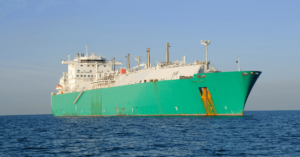
Real Life Incidents: Near Miss In Open Water And Good Visibility
A loaded LNG tanker was underway at about a speed of approximately 18 knots in good visibility..
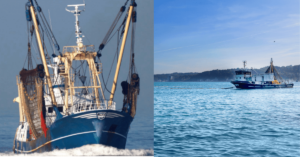
Real Life Incident: Poor Situational Awareness Leads to Collision
A general cargo vessel was proceeding in a Traffic Separation Scheme (TSS) at reduced power due to engine problems, making 4.5 knots at dead slow ahead.
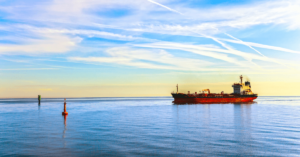
Real Life Incident: Monkey’s Fist Knocks on Office Window
A tanker was approaching a jetty for berthing, While still some distance from the jetty the first heaving line was thrown…
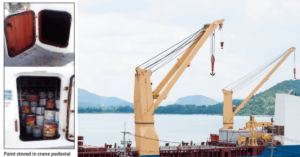
Real Life Incident: Paint Storage Slip-Up On Ship
During a Class inspection, the crew were surprised to find that the lower compartment of a crane pedestal contained many sealed paint cans..

Real Life Incident: Checklist Mentality Is A Burning Problem
The accident investigation revealed that the crewmember had loosened the filter cover without first releasing the system pressure from the vent cock.
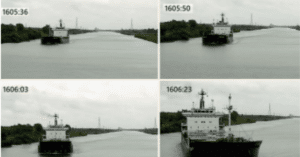
Real Life Incident: Vessel Speed Exacerbates Bank Suction
A general cargo vessel under pilotage was up-bound in a canal waterway under reduced speed in anticipation of meeting several down-bound vessels.
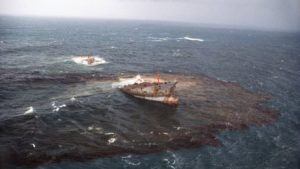
The Gruesome Amoco Cadiz Oil Spill Incident
The Amoco Cadiz Oil Spill is one of the worst maritime disasters which resulted in the single largest loss of marine life.
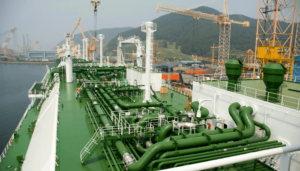
Real Life Incident: Vessel Collision in Good Visibility
An LNG tanker was proceeding in the open sea at a speed of approximately 21 knots in good visibility..
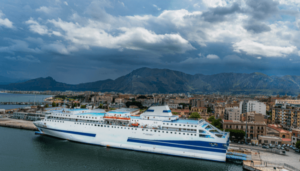
Real Life Incident: Severe Injury To Deck Crew While Leaving Berth
A RoRo ferry had finished loading and was leaving the berth. A strong onshore wind was pushing the ferry against the quay, and two bow thrusters were working at 100% to push the bow off the berth…
Subscribe to Marine Insight Daily Newsletter
" * " indicates required fields
Marine Engineering
Marine Engine Air Compressor Marine Boiler Oily Water Separator Marine Electrical Ship Generator Ship Stabilizer
Nautical Science
Mooring Bridge Watchkeeping Ship Manoeuvring Nautical Charts Anchoring Nautical Equipment Shipboard Guidelines
Explore
Free Maritime eBooks Premium Maritime eBooks Marine Safety Financial Planning Marine Careers Maritime Law Ship Dry Dock
Shipping News Maritime Reports Videos Maritime Piracy Offshore Safety Of Life At Sea (SOLAS) MARPOL
- Skip to primary navigation
- Skip to main content
- Skip to footer

7-DAY UNLIMITED ACCESS
Maritime law court decision could have outsize climate impact
By Sara Schonhardt | 05/20/2024 06:33 AM EDT
The case will decide for the first time whether countries have a legal obligation to cut their greenhouse gas pollution.

The cargo ship MV Bavaria is assisted by tugboats as it prepares to dock at Subic port in Zambales province, northwestern Philippines, on May 30, 2019. Aaron Favila/AP
An international court that governs maritime law is expected to issue a decision Tuesday that could have sweeping implications for how countries address climate change.
The coming opinion by the International Tribunal for the Law of the Sea in Hamburg, Germany, will determine for the first time whether countries are legally obligated to cut their planet-warming pollution. The ruling could have far-reaching consequences for other court decisions.
One thing it’s missing: the United States.
The tribunal applies to the United Nations Convention on the Law of the Sea, which requires member nations to protect and preserve the marine environment. But the U.S. has never ratified that convention, meaning any decision by the court wouldn’t have a direct bearing on U.S. governments or companies.
The transformation of the energy sector.
Policy. Science. Business.
Congress. Legislation. Politics.
The leader in energy and environment news.
Late-breaking news.
© POLITICO, LLC
Department of Commercial Law
- Administrative Staff
- Teaching Assistants
- Areas of Interest
- Arbitration & Dispute Resolution Unit - Governance
- Corporate Law and Governance Unit
- SARChI Chair: Intellectual Property, Innovation & Development
- Corporation Law
- Labour Law (LLB)
- Commercial Transactions Law
- Dispute Resolution
- Insurance Law
- Intellectual Property Law A
- Trademarks & unlawful competition
- International Trade and Maritime Law
- Trusts and Estate Planning
- Ways of Doing Business
- Independent Research Option
- Theory & Practice of Commercial Regulation and Governance
- Competition Law (LLB)
- Current Developments in Company Law
- Law, Development, Labour and Social Policy
- Law and Regional Integration in Africa
- Business Law 1
- Business Law 2
- Company Law
- Law for Engineers
- Shipping Law
- PG Dip Courses
- Master of Laws in Commercial Law
- Master's degree (LLM/MPhil) specialising in Comparative Law in Africa
- Master of Laws (LLM) in Dispute Resolution
- Master of Laws (LLM) in Intellectual Property Law
- Master of Laws (LLM) in International Trade Law
- Master of Laws (LLM) specialising in International Taxation
- Master of Laws (LLM) in Labour Law
- Master of Laws (LLM) in Shipping Law
- Master of Laws (LLM) in Tax Law
- Advanced Company Law
- Collective Labour Law
- Admiralty Jurisdiction & Practice
Maritime Law
- Carriage of goods by sea
- Commercial Arbitration
- Individual Employment Law
- Competition Law (LLM)
- Electronic Intellectual Property Law
- Electronic Transactions Law
- General Tax Law Provisions
- Advanced Tax Law
- Law and Regional Integration in Africa: Comparative Perspective
- Negotiation
- Corporate Financing
- International Commercial Transactions Law
- Workplace Discrimination and Equality Law
- Islamic Law and Finance
- Principles of Intellectual Property Law
- Advanced Intellectual Property Law
- Chinese Law and Investments in Africa
- Intellectual Property Law, Development and Innovation
- Company Law, Corporate Governance and Labour Law
- Marine Insurance Law
- Doctoral Degrees
Higher postgraduate course, first semester.
30 NQF credits at HEQSF level 9
Convener: Associate Professor G Bradfield
Course entry requirements: See Rules for LLM and MPhil degrees.
Course outline:
The course covers the law regulating ships and shipping activities, and that relating to civil legal claims arising out of shipping activities. The course focuses on South African law but has significant international and comparative components. It covers South African Merchant Shipping and related legislation regulating ships and shipping activities; registration and ownership of ships and South Africa’s role as Flag-, Coastal-, and Port-State in ensuring the safety of ships and shipping activities; the SOLAS Convention and ISM Code; the acquisition and transfer of ownership of ships; the financing of ships and shipping operations; safety of navigation; collisions; limitation of liability; marine pollution control and compensation; wreck; master and crew; salvage; towage, and pilotage.
DP requirements: None
Assessment: Coursework 25%, Examination 75%

IMAGES
VIDEO
COMMENTS
Case Summaries. This page includes a list of important cases in Pacific and international maritime law. Case Summaries - ADMIRALTY JURISDICTION. Case Summaries - ARREST OF SHIPS AND PRE JUDGMENT SECURITY. Case Summaries - CHARTERPARTIES. Case Summaries - COLLISION. Case Summaries - FISHERIES.
This paper seeks to review the pertinent Myanmar and Bangladesh history in overlapping maritime territorial claims leading up to the September 2011 International Tribunal for the Law of the Sea (ITLOS) case: Dispute Concerning Delimitation of the Maritime Boundary Between Bangladesh and Myanmar in the Bay of Bengal.
The law that applies to maritime operations at sea is complex and comprises two distinct elements: treaty law (1982 United Nations Convention on the Law of the Sea), and the cases and incidents that occur at sea in both peacetime and during armed conflict which result in the creation of customary international law applicable to maritime operations at sea.
The IMLI Manual on International Maritime Law. General Editor Prof. David Joseph Attard ... Drawing on the case study of Bangladesh due to its prominence in the shipbreaking industry, the author implements an environmental justice framework to examine the issues of sustainability surrounding shipbreaking, and analyses the relationship between ...
The review covers: Cases from the widest set of jurisdictions to date, including courts in the Eastern Caribbean, India and Malaysia. NEW for 2023: a "Sanctions" header, considering judicial review of sanctions decisions involving vessels. Coverage of two judgments arising from Australian cruise ship litigation following Covid-19 outbreaks ...
This is the authorative treatise on admiralty and maritime law. All aspects of maritime law are discussed - from carriage of goods by sea to admiralty rules to cruise ships - and leading cases are analyzed throughout. The work includes practice and procedure forms, as well as marine insurance forms. Admiralty and Maritime Law by Thomas Schoenbaum.
This book provides valuable insights into various contemporary issues in public and private maritime law, including interdisciplinary aspects. The public law topics addressed include public international law and law of the sea, while a variety of private law topics are explored, e.g. commercial maritime law, conflict of laws, and new ...
Welcome to The Journal of Maritime Law and Commerce (JMLC), a scholarly publication devoted to all aspects of admiralty and maritime law. As of January 1, 2021, the JMLC is under new ownership at the Roger Williams University School of Law. ... Master of Studies in Law. Designed for students who want to bring legal knowledge to their current ...
During the first year of the M.Phil. programme, students will attend IMLI with courses focusing on international maritime law, including law of the sea, shipping law, marine environmental law, and maritime security law. The second year of studies will be completed at WMU where students will pursue studies in ocean policy with a particular focus ...
maritime law, the body of legal rules that governs ships and shipping.. In English-speaking countries, "admiralty" is sometimes used synonymously, but in a strict sense the term refers to the jurisdiction and procedural law of courts whose origins may be traced to the office of Admiral. Although etymologically maritime law and " law of the sea" are identical, the former term is ...
Maritime Law combines federal and international laws which govern contracts, offenses, and injuries occurring on, in, or near navigable waters. Our students explore admiralty law, coastal law, international law, and law of the sea and can delve deeper by pursuing an LL.M. in Maritime Law . Students have a unique opportunity to learn from ...
University of Southampton - School of Law. Southampton, United Kingdom 51 Followers 132 Discussions. Founded in 1982, the school's Institute of Maritime Law explores various research topics in the field. Students pursuing the schools highly-regarded LL.M. in Maritime Law study near one of the United Kingdom's biggest ports.
The Future of Maritime Environmental Law. The case of the PS Dream is likely to have far-reaching implications for the maritime industry. It serves as a stark reminder of the severe penalties that ...
The Master of Laws (LL.M.) in International Maritime Law consists of post-graduate education in all areas of international maritime law, including law of the sea, shipping law, ... By submitting an application and nominating a person for studies at the Institute, both the applicant and the nominating authority are confirming that they are aware ...
Case Summaries - SEA CARRIAGE (Maritime Law Virtual Database) SEA CARRIAGE. Administration of the Territory of Papua and New Guinea v China Navigation Ltd [1967- 68] PNGLR 239 (1 December 1967) Sea Carriage- Loss of goods unshipped under Collector's Permit. The defendant carrier shipped the plaintiff's goods from Sydney to Port Moresby.
Real Life Incident: Departure Damage in Very Restricted Waterway. A tanker in ballast was departing from a river port, from a position which required a turn of approximately 180°. There was one pilot on board and one tug (the only one available) made fast aft. Read More.
Aaron Favila/AP. An international court that governs maritime law is expected to issue a decision Tuesday that could have sweeping implications for how countries address climate change. The coming ...
We would like to show you a description here but the site won't allow us.
Maritime Law. Higher postgraduate course, first semester. Course entry requirements: See Rules for LLM and MPhil degrees. The course covers the law regulating ships and shipping activities, and that relating to civil legal claims arising out of shipping activities. The course focuses on South African law but has significant international and ...
UKZN's Unit of Maritime Law and Maritime Studies' webinar on Enhancing Port-Sector Cyber Resilience in South Africa was the first. Read More » Law Lecturer Accepted as a Rhodes Oceans Scholar September 1, 2023